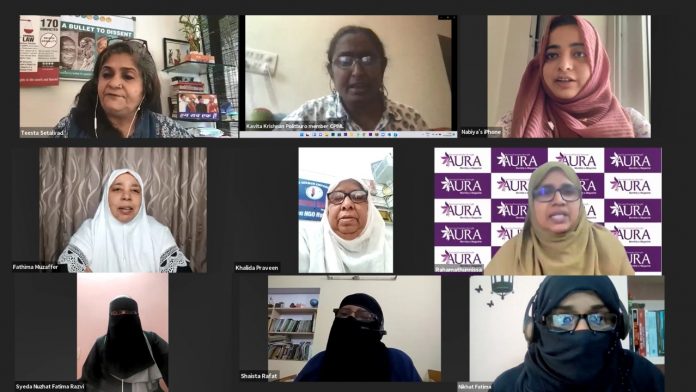
National Secretary of JIH Women’s Wing Rahamathunnissa said that after completing 74 years of Independence, the country is going backwards with regards to women’s progress. Teesta Setalvad, a civil rights activist and journalist expressed concern over the excess spending on marriages, dowry and use of gold in weddings and said that communities and civil society have a great role in uplifting women.
TCN News
NEW DELHI – Women activists, politicians and intellectuals have expressed concern over the situation of women’s rights in India, saying that the “country has failed to give its women the constitutional rights.” This was stated during a webinar organized by the Women’s Wing of Jamaat-e- Islami Hind (JIH).
The webinar was organized to open up a dialogue on the plight of women, identify reasons and suggest solutions.
In her introductory address, National Secretary of JIH Women’s Wing Rahamathunnissa said, “After completing 74 years of Independence, it has been proved that the country is going backwards with regards to women’s progress.”
She said that the latest data published by NCRB shows a rise of 7% in rape cases from 2018. “Women are still not given equal participation in decision-making bodies. The percentage is going down according to the Global Gender Gap Report 2021. It says India has declined on the political empowerment index by 13.5% points. The Digital 2021 April Global Statshop report says that the majority of people who are deprived of internet services in the world are Indian Women,” she said.
She advocated that only by making public places, educational institutions, health systems and legal systems female-friendly can women get the privilege of constitutional rights.
Teesta Setalvad, a civil rights activist and journalist said that communities and civil society have a great role in uplifting women.
She expressed concern over the excess spending on marriages, dowry and use of gold in weddings. “There is a preference over male children in every community. Religious scriptures talk about good things but the communities fail to implement them. The problem is very complex. The idea of India is secular and everyone’s right to choose has to be respected. The Sulli deal issue shows what kind of country we are in. Even though women suffer in general, there are some sections of women who are more targeted. There have been protests but not enough. The majority are silenced due to fear. She also expressed concern over the irresponsible portrayal of women in media to satisfy the male gaze and commercial industry. She also appreciated those women who are battling out,” she said.
Kavita Krishnan, Secretary of All India Progressive Association said that women are not safe and face a lot of atrocities in the present political environment of the country. “Shaheen Baghs were real examples of Indian Democracy and practical lessons on constitutional values. Women do not have control over their bodies and life. Indian culture does not consider women as humans like men. Girls are considered as property by family and society. Data shows only cases that are filed or those that are falsely filed. Atrocities on women within the families are mostly hidden and untold. Love jihad is propaganda. Consent or choice of girls is not considered in marriages. Respecting different opinions and choices is also part of freedom. Fearless freedom is what we require.” she said.
Nabiya Khan, an activist and poetess who was also put on auction by ‘Sulli Deals’ shared her experience regarding that. She presented her poem picturing the plight of Indian women and also expressed concern over the recent hate slogans at Jantar Mantar against minorities.
AS Fathima Muzaffer, writer and activist enlightened the audience on the glorious past of the Indian women in comparison with their present plight. “Now India has become the worst country for women to live in. The very fact that the test to know the gender of babies during pregnancy is banned due to the fear that the parents will kill them if they are girls is an acid test to prove the shameful situation. We hear sex scandals even from army offices. Education, Empowerment and Enforcement are the solutions and not Escapism,” she said.
Khalida Parveen, Secretary of Amoomat society said that the rules are good but the system is not. “There is a disparity in the approach with regards to men and women. There is no access for women in many government facilities.”
In her concluding address, Shaista Rafat, a member of the JIH Central Advisory Committee highlighted the role of women in independence.
She expressed concern that “GDP is falling down and the number of atrocities against women is going up.” She said that discussions like this should continue, adding, “We need to express our concerns loudly to pressurize the authorities to focus on the matter and provide justice.”
Fakhira Tabassum, the convener of the program welcomed the gathering and Rabiya, Nikhat Fatima and Nuzhat Fatima Razvi controlled the proceedings.
